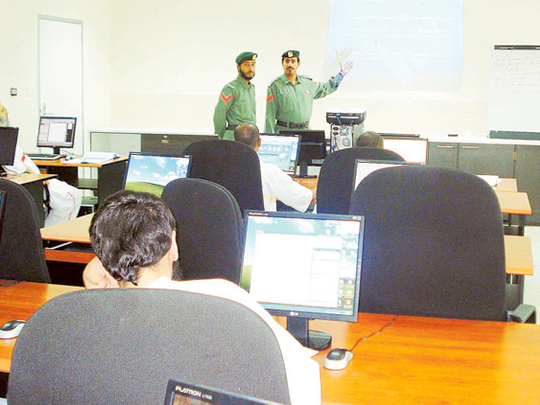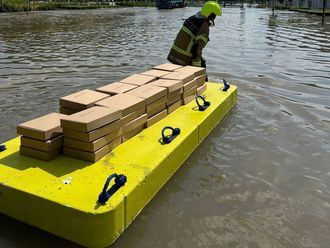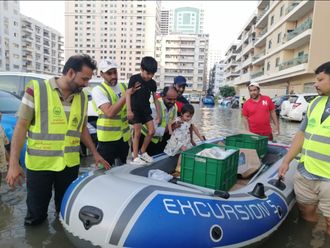
Dubai: Dubai Prisons’ inmates can finish their school education, learn the Quran, as well as computers and other skills that can help them get a job after they complete their sentences.
Major Abdullah Yaqoub Al Khedr, acting director of the Inmates Educational and Training Programmes Department at Dubai Police’s Punitive and Correctional Establishments, took Gulf News on a tour of the male inmates’ educational and training facilities.
There are four main categories in the educational and training programmes that the department provides to its inmates — Islamic, vocational training, educational and sporting programmes.
In 2013, 302 inmates — male and female — benefited from different vocational courses, such as basic vehicle mechanics, first aid, drawing and handicrafts. A total of 840 Islamic lectures were held in 2013.
During the tour, one of the inmates told Maj Al Khedr that they really enjoy the lectures and courses and would like to have even more.
Inmates, Maj Al Khedr said, also have access to a library and have their own TV channel, The Inmates Channel, that shows some inmate-made awareness films and has a ticker bar advertising the educational and training courses that are currently available, among other programmes.
Maj Al Kedr said that these educational and sporting programmes help keep the inmates busy and teach them things that can help them when they leave jail.
“Everyone makes mistakes, and we want them to have something after they leave here so they do not return to the wrong path.” Maj Al Khedr said.
All the certificates that are issued for inmates for any of the courses do not mention that he or she was an inmate.
“So, for example, they can take their computer skills certificate that was issued by Dubai Government and Microsoft and apply for a job without fearing any discrimination for what they had done in the past,” he said.
The computer lab at the department was presented by the Dubai Government.
Inmates who are continuing their school education are either enrolled as full-time or part-time students with the Ministry of Education.
They get tutored in jail, take their exams at the same time as students in school do and receive the same certificate that any pupil who finishes schooling from a public school would get.
Currently there are 25 full-time inmate students, who take regular classes from 4.15pm-7.50pm, while there are 38 part-time students.
Extensive library
The Dubai Police’s Punitive and Correctional Establishments’ Library houses some 5,400 books in different languages. Inmates borrowed 11,480 books in 2013. An average of 200 books are borrowed by inmates every month.
“If the inmate wants a book that is not available in our library, we check with the Dubai Culture and Arts Authority’s public libraries and, if they have it, the inmate fills a form.” Then the public libraries collect the book request and they are sent to the prison, Maj Al Khedr said.
He said that the inmate has 30 days to read the book and return it.
However, Maj Al Khedr explained that if the book the inmate wants is not available in the public libraries, the inmate can do one of three things; ask his family to buy it for him; the department can contact bookstores and ask them to reserve the book if available and the price of the book is taken out of the inmate’s account; or the department asks the Committee for Human Services at Dubai Prison if it can provide money for the prison’s library to buy it and the inmate can then borrow it.
“We have devised a new system, where each inmate has to write a summary of every book he borrows and how he benefited from it, and these summaries are kept in a folder which other inmates can read.”
He said that sometime inmates read the summaries and decide to borrow one of the books because of the summaries.
There is also an audio library.












